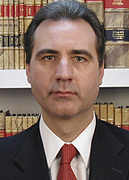“What do we talk about when we talk about judicial dialogue? Reflections from a Judge of the Inter-American Court of Human Rights.”

The Center for Civil and Human Rights was pleased to host this year’s Clynes Chair in Judicial Ethics, Eduardo Ferrer MacGregor, who concluded his visit to the Notre Dame Law School with a public lecture on Wednesday, October 1st, 2014, entitled “What do we talk about when we talk about judicial dialogue? Reflections from a Judge of the Inter-American Court of Human Rights.”
In the face of improving technology and growing globalization, courts of different jurisdictions have begun to engage in judicial dialogue with each other. As Judge Ferrer acknowledged, “ample literature has developed a documentation of theory”, but “little has been said by the users of this technique: the judges themselves.”
From Judge Ferrer’s perspective as a preeminent legal scholar and judiciary on the Inter-American Court of Human Rights, three particular considerations affect the present conversation about judicial dialogue: (1) the nature of contemporary globalization, which “has transformed the traditional concept of sovereignty and has modified the way in which national and international peers interact”; (2) what the idea of a ‘judicial dialogue’ that spans local, state, regional, and transnational jurisdictions actually means; and (3), the realization that the phenomenon of judicial dialogue in an idiosyncratically globalized world is a “developing process in an early stage”.
Judge Ferrer cited the benefits and limitations of situation judges now find themselves in, where near-instantaneous connection between judiciary bodies across the globe has created the unprecedented possibility of cross-jurisdiction dialogue. On one hand, Judge Ferrer MacGregor argued “We must remain aware about the possibility that the same issues can be decided by multiple judicial organs, or that international legal instruments can be applied by a number of courts and tribunals”, both international and domestic. On the other—and especially where “Domestic judges are entrusted with the application and development of international laws”—Judge Ferrer MacGregor warned “inconsistency might create uncertainty about the precise of the legal obligation that in the long term might undermine the international legal system.”
In summation of his remarks to an audience of legal scholars, law students, and the general public, Judge Ferrer concluded “The main objective is to promote the debate for a joint analysis and conversation, to invite you all to engage in this dialogue”.
Judge Eduardo Ferrer MacGregor, a legal scholar and professor at the Juridical Research Institute at the National Autonomous University of Mexico, was elected to the Inter-American Court of Human Rights for a 2013-2018 term.
Notre Dame Law School’s Clynes Chair in Judicial Ethics was established with a gift from Judge James J. Clynes Jr. The benefaction reflects Clynes’ strong interest in and dedication to promoting teaching and lecturing directly related to the ethics of litigation within the judicial process. Previous Clynes Visiting Chairs include: U.S. Supreme Court Associate Justice Samuel A. Alito Jr., U.S. Supreme Court Associate Justice Clarence Thomas, former Indiana Supreme Court Justice Randall Shepard, Judge Diarmuid O’Scannlain of the U.S. Court of Appeals for the Ninth Circuit Serves, and Justice Marta Cartabia of the Constitutional Court of Italy.